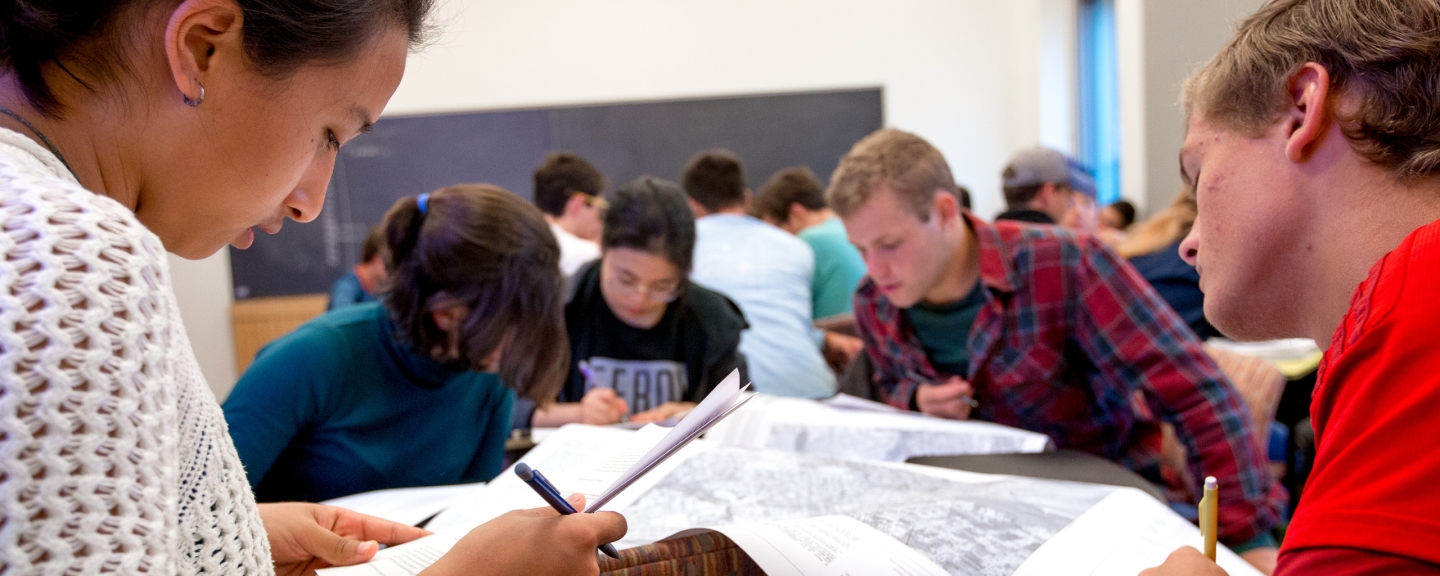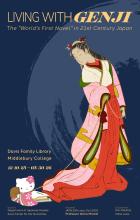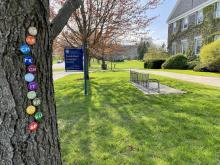
Experiential Learning
Leadership, creative thought, and intellectual risk taking

With a curriculum anchored in the liberal arts and sciences and an approach to learning responsive to an evolving, increasingly complex world, a Middlebury education is as distinct as it is comprehensive.
We offer a 21st-century global liberal arts and sciences education. Scholarship and research are not confined to the classroom or laboratory, nor even to a particular field of study. A robust offering of majors, minors, and academic programs not only provides students with a diverse range of disciplines to explore and to experience, but each discipline is intended to work in concert with another, fostering an evolution of cross-disciplinary collaboration that is at the heart of the academic experience at Middlebury.
Interested in the humanities and arts? STEM? Learning a language? Do you want to explore an interdisciplinary field like environmental studies? Do you envision a career in the social sciences?
The Middlebury curriculum is broad, deep, and flexible. Once here, you may decide to focus on a new area of study. You can engage in extracurricular pursuits like playing sports, writing for the student newspaper, or performing in a musical, and also participate in cocurricular activities, such as volunteering in the community, through our experiential learning centers, and much more.
Such exploration and immersion is the essence of a liberal arts education. Here you have the time, space, and support to pursue the many interests that appeal to you!
From your first-year seminar to your senior work, you can create an academic experience entirely your own at Middlebury. Explore the subjects you love and discover some new ones you’ve never considered. Now is the time to do it, and Middlebury makes it possible.
Academic advising is central to the undergraduate experience. It’s an ongoing conversation between students and faculty, beginning with your earliest days on campus and lasting over the years as you plan for graduation and life after college. You’ll also find the resources you need in other areas—from tutoring and writing help to planning and time management. The Center for Teaching, Learning, and Research is a wealth of peer and professional support. The Registrar’s Office is also a great source of useful information.
An undergraduate education at Middlebury is an immersive experience with the world—a global education—whether in Vermont or at any of our Middlebury schools and programs.
Middlebury has been offering immersion language learning from beginner to graduate level for more than 100 years. Each summer we welcome students from all walks of life and all parts of the world who want to study one of our 13 languages in an intensive and immersive environment.
Middlebury Language SchoolsThe Middlebury Institute of International Studies in Monterey, California, offers graduate programs that prepare students for professional roles in cross-cultural, multilingual environments. Its career-oriented degrees provide intentional focus on developing skills and implementing practical solutions worldwide.
Middlebury Institute of International StudiesWith 37 schools in 17 countries, students experience total immersion in the language and culture of their choice—an authentic experience at a local academic institution, engagement with the community, and personal discoveries.
Middlebury Schools AbroadCentrally located in Washington, D.C., these offices serve as a place for the entire Middlebury community to gather, learn, and network with experts here in the city, nationally, and internationally. We provide access to academic programming, educational events, and internship opportunities.
Middlebury in DC
Davis Family Library, Upper Level Display Cases
The students in JAPN 290 (“Reading the Tale of Genji” in English”) and Prof. Otilia Milutin (Japanese Studies) are cordially inviting you and your students to view their exhibit, “Living with Genji: The World’s First Novel in 21st Century Japan.” The exhibit features a selection of objects, artwork, movies, and manga inspired by the 11th century classic The Tale of Genji by Murasaki Shikibu. Our exhibit aims to showcase a few selected items that speak both of the tale’s enduring legacy in traditional Japanese arts, and, equally important, of its contemporary reiterations, be they manga and movies adaptations or commercial, consumer-oriented products such as mascots, stationary, fabrics, and other everyday objects. Through our exhibit, we hope to demonstrate how a millennium old classic lives and thrives today in contemporary Japan.
Middlebury College
Open to the Public
Mondays in March, learn to play the traditional Korean percussion genre samulnori. At these drop-in classes, participants will start by learning technique and basic rhythms and progress to more complex rhythms and sequences. Free, open to the public, and no experience needed. This class is geared towards adults.
The Bunker (FIC 121)
Open to the Public

Davis Family Library, Upper Level Display Cases
The students in JAPN 290 (“Reading the Tale of Genji” in English”) and Prof. Otilia Milutin (Japanese Studies) are cordially inviting you and your students to view their exhibit, “Living with Genji: The World’s First Novel in 21st Century Japan.” The exhibit features a selection of objects, artwork, movies, and manga inspired by the 11th century classic The Tale of Genji by Murasaki Shikibu. Our exhibit aims to showcase a few selected items that speak both of the tale’s enduring legacy in traditional Japanese arts, and, equally important, of its contemporary reiterations, be they manga and movies adaptations or commercial, consumer-oriented products such as mascots, stationary, fabrics, and other everyday objects. Through our exhibit, we hope to demonstrate how a millennium old classic lives and thrives today in contemporary Japan.
Middlebury College
Open to the Public
Students, staff, alumni and the public are invited to attend this weekly nonpartisan discussion of recent political events, hosted by Professor Matthew Dickinson. Held in person and by zoom almost every Tuesday, 12:30-1:30 pm EST. Check the calendar for dates. No expertise assumed. All viewpoints welcome. To register for the zoom sessions, please contact Prof. Dickinson at his email: dickinso@middlebury.edu
Robert A. Jones '59 Conference Room
Open to the Public

Learn about the summer Language Schools and semester-long Schools Abroad from program administrators and recently returned students who will share about the experience. All students are welcome!
Sunderland 110